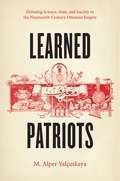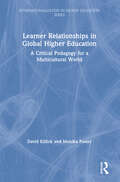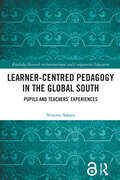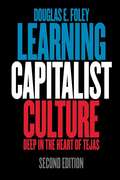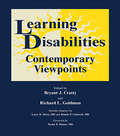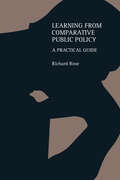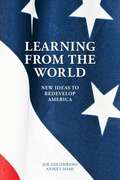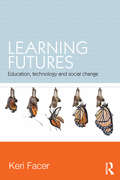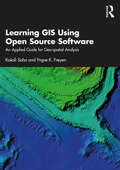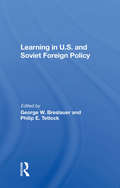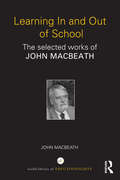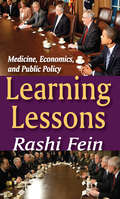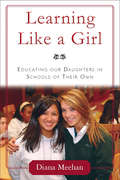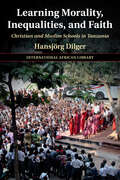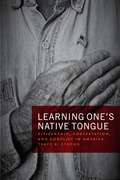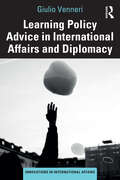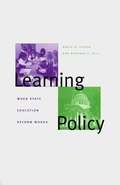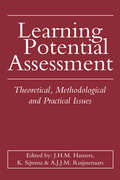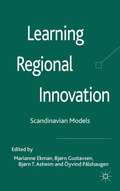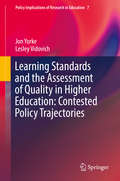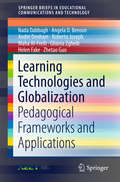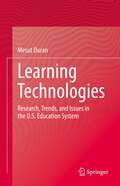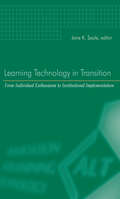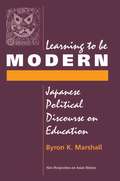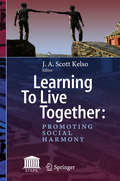- Table View
- List View
Learned Patriots: Debating Science, State, and Society in the Nineteenth-Century Ottoman Empire
by M. Alper YalcinkayaThe nineteenth century was, for many societies, a period of coming to grips with the growing, and seemingly unstoppable, domination of the world by the "Great Powers” of Europe. The Ottoman Empire was no exception: Ottomans from all walks of life--elite and non-elite, Muslim and non-Muslim--debated the reasons for what they considered to be the Ottoman decline and European ascendance. One of the most popular explanations was deceptively simple: science. If the Ottomans would adopt the new sciences of the Europeans, it was frequently argued, the glory days of the empire could be revived. In Learned Patriots, M. Alper Yalçinkaya examines what it meant for nineteenth-century Ottoman elites themselves to have a debate about science. Yalçinkaya finds that for anxious nineteenth-century Ottoman politicians, intellectuals, and litterateurs, the chief question was not about the meaning, merits, or dangers of science. Rather, what mattered were the qualities of the new "men of science. ” Would young, ambitious men with scientific education be loyal to the state? Were they "proper” members of the community? Science, Yalçinkaya shows, became a topic that could hardly be discussed without reference to identity and morality. Approaching science in culture, Learned Patriots contributes to the growing literature on how science travels, representations and public perception of science, science and religion, and science and morality. Additionally, it will appeal to students of the intellectual history of the Middle East and Turkish politics.
Learner Relationships in Global Higher Education: A Critical Pedagogy for a Multicultural World (Internationalization in Higher Education Series)
by David Killick Monika FosterProviding the academic community with a robust and highly practical insight into the importance of implementing relationship building into the learning environment and experiences of all students, underpinned by current research, this innovative volume explores intercultural learning and critical pedagogy in the borderless university. By revealing cutting-edge theoretical perspectives and practice which can facilitate critical connections between diverse students, their learning, curriculum, each other, and their communities, Learner Relationships in Global Higher Education integrates academic and student perspectives on relationship development into academic practice. Drawing upon case studies and examples of good practice from across the globe, this book illustrates how practitioners in diverse contexts are designing student experiences in face-to-face and online contexts on- and off-campus to advance learner relationships. By situating this work in a critical pedagogy perspective, the book advances internationalisation in and for a global and multicultural world. In the changing contexts of global higher education, this book is a valuable tool for higher education researchers and practitioners at all stages of their careers.
Learner-Centred Pedagogy in the Global South: Pupils and Teachers’ Experiences (Routledge Research in International and Comparative Education)
by Nozomi SakataLearner-Centred Pedagogy in the Global South: Pupils and Teachers’ Experiences shines light on learner-centred pedagogy (LCP), which has gained popularity within global and national governments, albeit resulting in puzzling and inconsequential appropriation. Nozomi Sakata draws on award-winning research on learner centred pedagogy conducted in Tanzania that looks to shift the focus from teachers and teaching to students and learning. The recent spread of LCP through global policy discourse meets Tanzania’s historical and contemporary (in)compatibility in local schools. The book explores how pupils’ perceived classroom experiences are formed through pedagogical elements beyond the classroom. It also enquires into how observable LCP activities and/or pupils’ perceptions of classroom practices relate to their academic performance and learning attitudes. The book highlights the multidimensionality of pedagogy and the need to consider multiple viewpoints from both teachers and pupils and to consider the historical and socio-cultural contexts in any pedagogical research. This book will be of value to researchers and students interested in pedagogy, policy transfer and education reforms in the global South. The Chapters 5, 6 and 8 of this book are available for free in PDF format as Open Access from the individual product page at www.routledge.com. It has been made available under a Creative Commons Attribution-Non Commercial-No Derivatives 4.0 license.
Learning Capitalist Culture: Deep in the Heart of Tejas (Contemporary Ethnography)
by Douglas E. FoleyLearning Capitalist Culture presents an updated ethnographic study of the small, economically depressed, predominantly Mexican American south Texas town. Many communities in the Southwest, North Town has undergone cultural and political change since the late 1960s, when the Chicano civil rights movement emerged and challenged the segregated racial order. The resulting racial confrontation between Mexican's and Anglo's created new tensions and problems for North Town youth. <p><p> Douglas E. Foley examines the way in which these youth learn traditional American values through participation in sports, membership in formal and informal social groups, dating, and interactions with teachers in the classroom. Foley shows how the rituals involved in these activities tend to preserve or reproduce class and gender inequalities, even as Mexicanos transform the racial order. This edition contains updated sections on theory and field methods, as well as an epilogue that revisits many of the characters in the original ethnographic research.
Learning Disabilities: Contemporary Viewpoints
by Brian J. Cratty Richard L. GoldmanThis volume examines the field of learning disabilities and the education of learning disabled (LD) children through the eyes of several experts. Contributors bring to the book such diverse academic backgrounds as education, psychology, special education and medicine. The chapters, adapted from lectures given at the Landmark West School in California, include audience questions and responses. Chapters on new medications for the LD child, contemporary research on dyslexia and educational strategies for improving reading are complemented bychapters on social and emotional issues that affect the families of learning disabled children, adolescents and young adults.
Learning From Comparative Public Policy: A Practical Guide
by Richard RoseThis textbook offers a fresh approach to the study of comparative politics and public policy. Instead of concentrating on why countries differ, Learning From Comparative Public Policy explores how countries can learn from each other about the success and failure of policy initiatives. With its theory and practise focus, the lively narrative analyzes the cultural and resources problems involved in importing policies, and the roles of institutions, regulators, think tanks and experts.In addition to explaining the key tenets of policy analysis, the internationally renowned author offers a wide variety of international case studies and useful boxes to highlight examples. Invaluable reading for students of public policy, for policy makers and practioners working in the public sector, it includes:* learning from comparison* defining a problem and creating awareness* where to look for lessons* applying the policy model* the problems of importing models* using terms to evaluate future consequences.
Learning From The World
by Joe Colombano Aniket ShahWhat can America learn from countries as faraway and diverse as Bhutan, Chile, Denmark, Nigeria and South Korea? Quite a lot, as it turns out. At a time of fundamental change in global power, the country that undisputedly ruled the latter half of the 20th century is no longer firmly in the lead. In the search for new ideas to redevelop America, co-editors Joe Colombano and Aniket Shah point to what has happened outside the borders of the United States. By relying on a wealth of cross-country and multi-disciplinary contributions from an impressive number of world-renown experts, the editors provide a systematic review of successful policies undertaken overseas, discuss their relevance to the US, and offer them as contributions to the national debate on the future of the American economy. What they find is a rich set of policy recipes - from maintaining fiscal discipline and fostering growth, to reviving competitiveness to ensuring equity and basic human decency.
Learning Futures: Education, Technology and Social Change
by Keri FacerIn the twenty-first century, educators around the world are being told that they need to transform education systems to adapt young people for the challenges of a global digital knowledge economy. Too rarely, however, do we ask whether this future vision is robust, achievable or even desirable, whether alternative futures might be in development, and what other possible futures might demand of education. Drawing on ten years of research into educational innovation and socio-technical change, working with educators, researchers, digital industries, students and policy-makers, this book questions taken-for-granted assumptions about the future of education. Arguing that we have been working with too narrow a vision of the future, Keri Facer makes a case for recognizing the challenges that the next two decades may bring, including: the emergence of new relationships between humans and technology the opportunities and challenges of aging populations the development of new forms of knowledge and democracy the challenges of climate warming and environmental disruption the potential for radical economic and social inequalities. This book describes the potential for these developments to impact critical aspects of education – including adult-child relationships, social justice, curriculum design, community relationships and learning ecologies. Packed with examples from around the world and utilising vital research undertaken by the author while Research Director at the UK’s Futurelab, the book helps to bring into focus the risks and opportunities for schools, students and societies over the coming two decades. It makes a powerful case for rethinking the relationship between education and social and technological change, and presents a set of key strategies for creating schools better able to meet the emerging needs of their students and communities. An important contribution to the debates surrounding educational futures, this book is compelling reading for all of those, including educators, researchers, policy-makers and students, who are asking the question 'how can education help us to build desirable futures for everyone in the context of social and technological change?'
Learning GIS Using Open Source Software: An Applied Guide for Geo-spatial Analysis
by Kakoli Saha Yngve K. FrøyenThis book introduces the usage, functionality, and application of data in geographic information systems (GIS) for geo-spatial analysis. It offers knowledge on GIS tools and techniques and explains how they can be applied in real-world project to architects and planners in the Indian and the Greater South Asian context using open-source software. The volume explains concepts on planning and architectural tasks, their data, methods and requirements followed, and includes GIS-related exercises on the same tasks. It takes the reader through the concepts of geo-spatial analysis and its referencing system while quoting examples from India. Further, the content of the book will help the planners involved in preparing GIS-based master planning for cities under the Atal Mission for Rejuvenation and Urban Transformation (AMRUT) scheme (see Glossary for details). A practical guidebook providing a step-by-step guide to learn open source GIS, this book will be useful for students, scholars and professionals from the field of architecture and planning, geography and other spatial sciences, instructors of GIS course on planning and architecture, urban and regional planners, transport planners, urban design, landscape architects, environmental planners, departments of town and country planning, and development authorities. It will also be useful for anyone interested in the geospatial analysis.
Learning In U.s. And Soviet Foreign Policy
by George BreslauerAre policymakers capable of learning about the complex international environment they must deal with when formulating foreign policy? Interest in the phenomenon of "learning" has been growing, driven in part by the advent of Gorbachev, and by prospects for ending the Cold War. In this book, leading scholars explore the theoretical and practical imp
Learning In and Out of School: The selected works of John MacBeath
by John MacBeathIn the World Library of Educationalists series, international experts themselves compile career-long collections of what they judge to be their finest pieces - extracts from books, key articles, salient research findings, major theoretical and practical contributions - so the world can read them in a single manageable volume.John MacBeath has spent
Learning Lessons: Medicine, Economics, and Public Policy
by Rashi FeinThis is a book about the policy process. It discusses the considerations advisers have in mind as they develop and select policy alternatives, the ways each of us might want to think about making decisions, and the lessons we should remember in order to minimize avoidable errors. In writing about his experiences in government, the classroom, and private life, Fein offers insights that apply to people responsible for decisions in many kinds of institutions, at all levels of responsibility.His anecdotes and the situations he describes are drawn from over fifty years of experience in the policy arena. They are not intended to represent either a rounded theory about public administration or a comprehensive treatment of important components of political science. Like most people in the policy arena, Fein came to that work from another discipline-in his case economics. His experience of finding his own way through action and experience rather than through application of theory might appear quaint. But his successes, failures, and the lessons he learned, illuminate the process and may prove useful, even inspirational.Fein is sensitive to the need to move beyond statistics and to present the real world and the faces of real people behind the data. He believes that an effective adviser should bring knowledge and interests that extend beyond the confines of a single discipline, even one as methodologically powerful as economics. Unless the adviser presents a range of choices that have been developed with contributions from many fields of knowledge, the proposed policies are likely to be far too constrained and, at worst, unworkable. His perspective, articulated in this book, is easily summarized: there is more to life and to our nation's welfare than economics. We live in a society, not in an economy.
Learning Like a Girl: Educating Our Daughters in Schools of Their Own
by Diana MeehanFaced with a spirited eleven-year-old daughter, a concern about what therapists have called a 'poisonous' youth culture- especially for girls-and a conviction that parents need powerful tools to help their daughters realize their potential, educator-activist DianaMeehan was disappointed in the selection of schools available. So she decided along with two other mothers to create one, based on social science and brain research on how girls learn best. The result, The Archer School in L. A. , has in only ten years become a model for girls' schools nationwide. In this entertaining, inspiring book, Meehan describes her obstacle-ridden journey to create a new institution to serve girls first and foremost, while laying out through vivid stories and examples what girls need to thrive. She explains why co-education so often doesn't serve them (just as it doesn't serve boys), takes sides in the controversy over male/female learning differences, and advocates for schools' role in giving girls tools to navigate through our sexualized, materialistic culture. She also visits other schools around the country-private and public-to show how single sex education works, and how every girl everywhere can benefit from having a classroom of her own.
Learning Morality, Inequalities, and Faith: Christian and Muslim Schools in Tanzania (The International African Library)
by Hansjörg DilgerChristian and Muslim schools have become important target points in families and pupils' quests for new study opportunities and securing a 'good life' in Tanzania. These schools combine secular education with the moral (self-)formation of young people, triggering new realignments of the fields of education with interreligious co-existence and class formation in the country's urban centres. Hansjörg Dilger explores the emerging entanglements of faith, morality, and the educational market in Dar es Salaam, thereby shedding light on processes of religious institutionalisation and their individual and collective embodiment. By contextualising these dynamics through analysis of the politics of Christian-Muslim relations in postcolonial Tanzania, this book shows how the field of education has shaped the positions of these highly diverse religious communities in diverging ways. In doing so, Dilger suggests that students and teachers' religious experience and practice in faith-oriented schools are shaped by the search for socio-moral belonging as well as by the power relations and inequalities of an interconnected world.
Learning One’s Native Tongue: Citizenship, Contestation, and Conflict in America
by Tracy B. StrongCitizenship is much more than the right to vote. It is a collection of political capacities constantly up for debate. From Socrates to contemporary American politics, the question of what it means to be an authentic citizen is an inherently political one. With Learning One’s Native Tongue, Tracy B. Strong explores the development of the concept of American citizenship and what it means to belong to this country, starting with the Puritans in the seventeenth century and continuing to the present day. He examines the conflicts over the meaning of citizenship in the writings and speeches of prominent thinkers and leaders ranging from John Winthrop and Roger Williams to Thomas Jefferson, Nathaniel Hawthorne, Abraham Lincoln, Frederick Douglass, and Franklin Roosevelt, among many others who have participated in these important cultural and political debates. The criteria that define what being a citizen entails change over time and in response to historical developments, and they are thus also often the source of controversy and conflict, as with voting rights for women and African Americans. Strong looks closely at these conflicts and the ensuing changes in the conception of citizenship, paying attention to what difference each change makes and what each particular conception entails socially and politically.
Learning Policy Advice in International Affairs and Diplomacy (Innovations in International Affairs)
by Giulio VenneriLearning Policy Advice in International Affairs and Diplomacy broadens understanding of, and helps develop the skills necessary for, effective written and oral communication in the realm of international affairs and diplomacy.Readers will become acquainted with the principles of policy development and find practical guidance on how to design and implement policy advice. Crucial insights are offered on how to successfully nurture those aptitudes and approaches that are expected in demanding professional contexts from the very start of a career. Effective drafting techniques for written communication are presented, explaining methods and practices that facilitate the delivery of meaningful policy advice through written output. Regarding oral communication, the book demonstrates how aspiring policy advisers can build a positive narrative about their background, profile and experience, in order to win over selection panels for jobs across the international community. The book explains how to tackle interview panels, and prove to recruiters the necessary competence, skills, vision, and motivation to perform efficiently and reliably in an international or EU policy role. By raising awareness of institutional communication practices and public outreach, the book will also give readers a sound understanding of perception management challenges in international politics and diplomacy. Building on twenty years’ experience as a policy insider in the international community, the author provides qualitative interviews with many other practitioners, including high-ranking officials, from different organisations and foreign services, as well as with scholars who have alternated academic engagement with appointments to key policy roles in diplomacy.Containing example scenarios and practice exercises throughout, this pioneering book helps students, graduates and professionals aspiring to build a career in international affairs to acquire practical skills which are essential to recruiters in the diplomatic world, international institutions, NGOs, think tanks, as well as the private sector.
Learning Policy: When State Education Reform Works
by David K. Cohen Heather C. HillThis book reports on one of the more significant school-improvement policies in late-twentieth-century America: California's decade-long effort to change and improve mathematics teaching in the state's public schools.
Learning Potential Assessment
by J.H.M. HamersLearning potential assessment, which has lately been receiving a great deal of attention, consists of test procedures for measuring children's learning potential procedures that be regarded as an extension of current intelligence testing.
Learning Regional Innovation
by Marianne Ekman Bj�rn Gustavsen Bj�rn T. Asheim �yvind P�lshaugenParticipation and social responsibility in innovation is the core theme of this book. Both are issues of organization and not of ethics, or the enforcement of other forms of obligations on individual actors. The need is for a democratization of innovation that can make innovation open to broad participation.
Learning Standards and the Assessment of Quality in Higher Education: Contested Policy Trajectories
by Jon Yorke Lesley VidovichThis book analyses accountability and quality policies relating to learning standards and examines their implications for assessment in higher education. Whilst primarily focusing on the Australian setting, this analysis is located within a broader frame of reference that includes the United Kingdom (UK), the United States of America (US), and the Organisation for Economic Cooperation and Development (OECD). Across these settings, comparative measures of learning have been seen as a policy 'solution' to the problem of 'proving quality' in a globalised and increasingly competitive higher education market. Comparative measures of learning depend on the specification of learning standards. Learning standards attempt to articulate the capabilities expected of graduates, and students' achievement of these is determined through the practices of assessment carried out within institutions. Quality policy, learning standards and assessment practices all intersect within the broader umbrella of accountability, with relevance to governments, higher education providers, employers, parents, and students. The findings reported in this book highlight a number of policy influences, including the rising demands for national and international comparative data on learning standards to compare quality and inform student choice in a globally competitive market.
Learning Technologies and Globalization
by Nada Dabbagh Angela D. Benson André Denham Roberto Joseph Maha Al-Freih Ghania Zgheib Helen Fake Zhetao GuoThis brief describes the evolutionary and global impact of the techno-social transformation on learning technologies in terms of emerging pedagogical frameworks and applications. it provides examples of such applications in higher education, K-12, and the workplace, across the globe. The transformation and diffusion of ICT into an ever-present and accessible phenomenon is fundamentally shaping human activity and culture, changing human identity, and redefining globalization. Global activities have widened, intensified, and accelerated as a result of ICT integration generating a new awareness of the world as a techno-social environment. This emergent global environment is introducing unprecedented socio-economic opportunities; however, it is also bringing new risks and challenges, particularly as this relates to learning technologies, most especially in higher education contexts.
Learning Technologies: Research, Trends, and Issues in the U.S. Education System
by Mesut DuranWith a historical context covering the past 20 years, this book provides in-depth discussions of research, trends, and issues related to learning technologies in K-12 schools, higher education settings, and educational administration in the U.S. Given the remote learning challenges and opportunities that the COVID-19 pandemic has recently brought to our attention, world-wide interest in educational technology-related issues is at its peak. Therefore, this book is specifically directed at the entire educational technology field, educators, educational leaders, researchers, and policymakers alike who are interested in learning technologies in the U.S. educational system.Three main resources guide the discussions in the book. First, an extensive literature review related to the book’s central focus—learning technologies in the U.S. education system, including relevant studies published over the last two decades-is presented. Second, reflections on the author's twenty years of professional teaching, research, and scholarship focused on educational technology at a major U.S. research university are provided. And third, the viewpoints of students in the graduate—level educational technology courses taught by the author, presenting the vital perspective of practicing teachers and educational leaders regarding how learning technologies affect their schools and their work within them, are considered. All of these perspectives and data combine to provide a comprehensive overview on the topic of learning technologies in the U.S. education system. Together, they create a book that is indispensable for anyone interested in learning technologies in education.
Learning Technology in Transition: from Individual Enthusiasm to Institutional Implementation
by Jane K. SealeIn April 2003, The Association for Learning Technology (ALT) celebrated its tenth anniversary and this book has been produced in order to commemorate this landmark achievement. It represents a collaboration between key members of ALT and members of ALTs' sister organisations: SURF in Holland and ASCILITE in Australia.The aims of the book are to use
Learning To Be Modern: Japanese Political Discourse On Education
by Byron MarshallIn the increasingly global economy, commentators often cite education as a key source of competitive advantage for nations locked in economic contention on the world stage. Byron Marshall examines the evolution of Japanese schools over the past 120 years. Emphasizing the political discourse and conflict that have surrounded Japanese education, the author focuses on the three main issues of central versus local control, elitism versus equality, and nationalism versus universalism. The prewar education system in Japan was formulated in the 1870s and modeled after the Western system of public education. After World War II, the American Occupation authorities attempted to reform this system further, but how much discontinuity with the past was produced by the postwar reforms is still an open question.Of course, the dilemmas facing Japanese schools are endemic to all modern school systems, and Marshall's broad historical survey provides a valuable case study of Japanese attempts to strike a balance between equality and excellence, individual creativity and team cooperation, standardization and innovation, and internationalism and cultural identity. The book thus provides a valuable historical perspective on contemporary American issues of "political correctness" such as gender and ethnicity.As we head toward the "Pacific Century," this book gives readers the background and insight necessary to make informed judgments about the relative strength of Japanese education and the merits of various school reforms.
Learning To Live Together: Promoting Social Harmony
by J. A. Scott KelsoThis book is devoted to the issue of how we can learn to live together in the face of division and conflict. It is dedicated to the life and work of a remarkable human being, Dr Epimenidis Haidemenakis, scientist, statesman, visionary leader, President Emeritus of the International S.T.E.P.S. Foundation and founding father of The Olympiads of the Mind (OM). The monograph consists of a collection of papers presented at the 8th and 9th Olympiads of the Mind held in Washington, DC and Chania, Crete respectively. Distinguished international scholars, government and corporate representatives, leading researchers and academics from multiple disciplines and Nobel Laureates Leon Lederman (Physics, 1988), Martin Perl (Physics, 1995) and Yuan T. Lee (Chemistry, 1986) address a broad range of issues all with the aim of improving the human condition and achieving cooperation among the people of the world. The topics include the environment, sustainability and security; diversity and how to achieve integration and peace among people in a fractured world; the important role of brain research; how to overcome poverty and inequality; how to enhance creativity and improve education at all levels; and how new technologies and tools can be used for common benefit. The culmination of the book is a call to action, to join what one might call the “OM Movement”—bringing the best minds in the world together to create solutions to world issues so that we can all live together in harmony.
